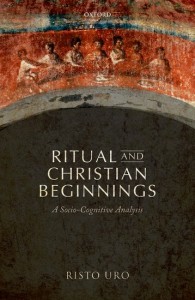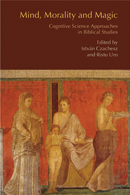 Risto Uro, Ritual and Christian Beginnings: A Socio-Cognitive Analysis. Oxford: Oxford University Press 2016.
Risto Uro, Ritual and Christian Beginnings: A Socio-Cognitive Analysis. Oxford: Oxford University Press 2016.
The rise of early Christianity has been examined from a myriad of perspectives, but until recently ritual has been a neglected topic. Ritual and Christian Beginnings: A Socio-Cognitive Analysis argues that ritual theory is indispensable for the study of Christian beginnings. It also makes a strong case for the application of theories and insights from the Cognitive Science of Religion, a field that has established itself as a vigorous movement in Religious Studies over the past two decades. Risto Uro develops a ‘socio-cognitive’ approach to the study of early Christian rituals, seeking to integrate a social-level analysis with findings from the cognitive and evolutionary sciences.
Ritual and Christian Beginnings provides an overview of how ritual has been approached in previous scholarship, including reasons for its neglect, and introduces the reader to the emerging fields of Ritual Studies and the Cognitive Science of Religion. In particular, it explores the ways in which cognitive theories of ritual can shed new light on issues discussed by early Christian scholars, and opens up new questions and avenues for further research. The socio-cognitive approach to ritual is applied to a number of test cases, including John the Baptist, the ritual healing practiced by Jesus and the early Christians, the social life of Pauline Christianity, and the development of early Christian baptismal practices. The analysis creates building blocks for a new account of Christian beginnings, highlighting the role of ritual innovation, cooperative signalling, and the importance of bodily actions for the generation and transmission of religious knowledge.
Read a free sample here.
Reviews:
“Ritual and Christian Beginnings: A Socio-cognitive Analysis is a perfect example of a cross-disciplinary approach in which New Testament studies goes beyond itself, engaging other fields of science. . . . This book sets a high standard for anyone using a tool or a methodology from outside of one’s home discipline, a standard to which all biblical scholars should strive. . . . It is highly recommended to those interested in the study of the rituals of any religious group of any time.” (Maria Karyakina, Review of Biblical Literature, 07/2017)
 I. Czachesz & R. Uro (eds.), Mind, Morality, and Magic: Cognitive Science Approaches in Biblical Studies. Durham: Acumen (publication date Sept 2013). A comprehensive volume on the application of cognitive science to biblical materials.The cognitive science of religion that has emerged over the last twenty years is a multidisciplinary field that often challenges established theories in anthropology and comparative religion. This new approach raises many questions for biblical studies as well. What are the cross-cultural cognitive mechanisms which explain the transmission of biblical texts? How did the local and particular cultural traditions of ancient Israel and early Christianity develop? What does the embodied and socially embedded nature of the human mind imply for the exegesis of biblical texts? Mind, Morality and Magic draws on a range of approaches to the study of the human mind – including memory studies, computer modeling, cognitive theories of ritual, social cognition, evolutionary psychology, biology of emotions, and research on religious experience. The volume explores how cognitive approaches to religion can shed light on classical concerns in biblical scholarship – such as the transmission of traditions, ritual and magic, and ethics – as well as uncover new questions and offer new methodologies. More information at the publisher’s website.
I. Czachesz & R. Uro (eds.), Mind, Morality, and Magic: Cognitive Science Approaches in Biblical Studies. Durham: Acumen (publication date Sept 2013). A comprehensive volume on the application of cognitive science to biblical materials.The cognitive science of religion that has emerged over the last twenty years is a multidisciplinary field that often challenges established theories in anthropology and comparative religion. This new approach raises many questions for biblical studies as well. What are the cross-cultural cognitive mechanisms which explain the transmission of biblical texts? How did the local and particular cultural traditions of ancient Israel and early Christianity develop? What does the embodied and socially embedded nature of the human mind imply for the exegesis of biblical texts? Mind, Morality and Magic draws on a range of approaches to the study of the human mind – including memory studies, computer modeling, cognitive theories of ritual, social cognition, evolutionary psychology, biology of emotions, and research on religious experience. The volume explores how cognitive approaches to religion can shed light on classical concerns in biblical scholarship – such as the transmission of traditions, ritual and magic, and ethics – as well as uncover new questions and offer new methodologies. More information at the publisher’s website.
A. K. de Hemmer Gudme, Before the God in This Place for Good Remembrance: A Comparative Analysis of the Aramaic Votive Inscriptions from Mount Gerizim. Beihefte zur Zeitschrift fur die Alttestamentliche Wissenschaft. Berlin: Walter de Gruyter 2013.
R. Roitto. Behaving as a Christ-Believer: A Cognitive Perpective on Identity and Behavior Norms in Ephesians. Winona Lake, IN: Eisenbrauns 2011.
P. Luomanen, I. Pyysiäinen, & R. Uro (eds), Explaining Christian Origins: Contributions from Cognitive and Social Science. Biblical Interpretation 89. Leiden: Brill, 2007.